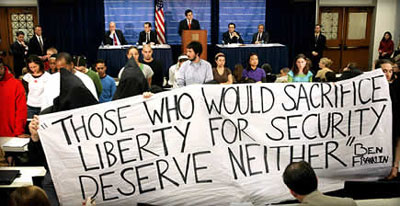Friday, January 27, 2006
Ten thousand truths were told, and it was good
* Put DGD on your blogroll if you have a blog, or add a link on your website if you have one
* Put a link to DGD in your e-mail signature block
* Put a link to DGD in your instant messenger profile and away messages
* Send out an e-mail to your friends specifically telling them to check us out
* Make sure to comment on other, more popular, blogs and tell folks to visit DGD
* Put a link to DGD on your SSDP chapter's flyers or mention DGD at your next meeting
* Have your SSDP chapter start its own free blog on blogspot and link to DGD (we'll link to you too!)
* Make sure to sign up for SSDP's periodic action alerts so you can forward our interesting and exciting messages to your friends when you get them
We're telling the truth about the disastrous impact the War on Drugs has on youth and everyone else here. The more people that read this, the closer we'll be to ending the Drug War.
Students spank Drug Czar at his own show
...
...
Folks who want to spread truth at the upcoming drug testing summits in San Diego, Milwaukee, or Falls Church should contact SSDP!
Thursday, January 26, 2006
SSDP sues the government
Below is our press release. Please sign up for important SSDP news and action alerts!
FOR IMMEDIATE RELEASE - January 26, 2005
Education Department Sued for Withholding Information
Student Group Seeks to Expose Impact of Drug Law
Government Says Info Could Lead to Drug Legalization and Profiteering
WASHINGTON, DC – One of the largest student organizations in the country sued the U.S. Department of Education today over a Freedom of Information Act dispute. The group, Students for Sensible Drug Policy (SSDP), wants to know how many people in each state have lost financial aid because of a law that blocks eligibility to students with drug convictions. Congress is expected this month to scale back the law, which has stripped aid from more than 175,000 students nationally since being enacted in 2000.
SSDP, represented by the consumer advocacy organization Public Citizen, filed suit in the U.S. District Court for the District of Columbia. The suit stems from a refusal by the government to waive a hefty fee to provide the data. The Department of Education erroneously claims that providing the information is not in the public interest, but instead could further the commercial interests of those who might profit from the legalization of drugs.
“The requested records reveal how the government operates when determining who does and does not get financial aid,” said Adina Rosenbaum, the Public Citizen attorney handling the case. “The public interest in disclosure of the records clearly outweighs SSDP’s nonexistent commercial interest in the information.”
Added Scarlett Swerdlow, executive director of Students for Sensible Drug Policy, “It’s no big surprise that the government is afraid to reveal the true impact of its punitive Drug War policies. If citizens and legislators knew how this misguided and ineffective policy impacts their communities, we would be much closer to erasing it from the law books. Blocking college access to thousands of would-be students only makes our nation’s drug problems worse.”
Although the Department of Education is willing to release the information, a records officer said that SSDP hasn’t provided enough evidence to demonstrate an entitlement to a waiver of the $4,000 processing fee required to compile the data.
A copy of the suit is available at http://www.ssdp.org/SSDP_v_DOE.pdf
Students for Sensible Drug Policy, an organization with college and high school chapters, is committed to providing education on harms caused by the War on Drugs, working to involve youth in the political process, and promoting an open, honest, and rational discussion of alternative solutions to our nation's drug problems. Visit www.DAREgeneration.com. Public Citizen is a national, nonprofit consumer advocacy organization based in Washington, D.C. Visit www.citizen.org.
# # #
Contact Tom Angell at tom//at//ssdp.org for more information.
Ben Franklin would be proud...
 Gonzales's trip to Georgetown is just one part of a desperate national propaganda campaign aimed at justifying the illegal and unconstitutional wiretapping program that the Bush administration hid from the public until forced to disclose it recently.
Gonzales's trip to Georgetown is just one part of a desperate national propaganda campaign aimed at justifying the illegal and unconstitutional wiretapping program that the Bush administration hid from the public until forced to disclose it recently.Those older than I will remember that the Drug War was the first post-Cold War program to justify domestic wiretapping on a large scale. It wasn't very hard for the DEA to acquire warrants to conduct these wiretaps, but at least they had to present some evidence that a crime was being committed. But now that the Bush Administration has conjoined the drug trade with terrorism - a la NarcoTerrorism - it's not hard to imagine that these warrentless wiretaps are being used for much more than catching Al Qaeda members.
The protest was covered by the national media, including: CNN, the New York Times, and (gasp!) even BoingBoing!
Bravo, freedom fighters!
Wednesday, January 25, 2006
Students are dying to see campus drug policies changed
It turns out that many of these deaths would have been prevented by sensible campus drug policies. But instead, far too many colleges and universities keep looking for more and more ways to punish students for using alcohol or other drugs, even if the threat of these punishments deters students from taking simple lifesaving steps.
Lynn Gordon Bailey, a student at the University of Colorado, died shortly after the start of his freshman year because his fraternity friends didn't call the paramedics for help in time, out of fear they'd be punished. The call was made the next morning, only after it became clear that he was already dead.
You can listen to the belated 911 call here.The signs of death were obvious to emergency medical technician Thomas Dunn as he examined Lynn Gordon "Gordie" Bailey's face on Sept. 17, 2004. Answering a 911 call, rescuers found that the college freshman had died the previous night from an alcohol overdose.
...
As he went door-to-door inside the Chi Psi house in Boulder, Dunn, a psychology professor at the University of Northern Colorado and part-time EMT, woke up students to ensure that there were no more victims from the initiation party. When he looked around the house littered with empty bottles, Dunn says, it was his experience as a teacher that spoke to him. "I thought, 'Where did we let these kids down?' " Dunn says. "Very little about that house, from what I saw, had any evidence of scholarly pursuits. ... I was appalled."
As Dunn woke up still-drunken students and told fraternity leaders that Bailey was dead, he watched them go from crying to becoming fearful and silent.
This is just one of several examples mentioned in the USA Today article, and is one of way too many preventable college student deaths each year. Luckily, some schools and state governments are now taking action to save lives.
This is one of the reasons SSDP has just launched a new campaign that will help students enact sensible drug policies on their campuses. Colleges and universities aren't going to take action by themselves. Its up to us to make them adopt policies that stop killing students.After Bailey's death, the Colorado Legislature enacted a law that grants immunity to anybody drinking illegally who calls 911 to get help for a drunken friend. Dunn says medics are now getting more calls.
National fraternity leaders are encouraging students to call for help without worrying about getting the fraternity in trouble.
"One of the biggest problems out there is students are afraid to call for help," says Geof Brown, director of alcohol-education initiatives for the North America Interfraternity Conference, which has 5,500 chapters at 800 campuses. "Our groups are taking a more proactive posture these days."
Tuesday, January 24, 2006
Don't show me the money
And in Iosco County - hey! - the drug testing would be free.
Tawas St. Joseph Health Systems received $525,000 from the federal government for the program after officials in the Tawas, Oscoda, Whittemore-Prescott and Hale school districts backed the grant application.
Just as we teach our younger children not to take candy from strangers, Iosco County school leaders should think long and hard before they ally with a program that may have unintended consequences.
The federal government's money would be better spent in schools on new education programs about the dangers of drugs. And to enlist parents and the community in the campaign against drug and alcohol abuse.
Too many schools around the country are being baited by the millions of dollars the Drug Czar is dangling in front of them. The money would be better spent on other things (or just left in taxpayers' pocketbooks).
The Drug War means young people get shot
Officers said two carloads of people were behind the school just after 8 p.m. when gunshots rang out. Eric Nelson, 17 was found minutes later at the intersection of Dana Avenue and Grigg Avenue with a gunshot wound to the upper left chest. Raymond Montgomery, 20, was also wounded.When was the last time you heard about two beer distributors getting into a gunfight over who gets to stock a particular store? The answer is never, because beer is a true controlled substance and distribution disputes are handled in the courts.
If we regulated drugs, disasters like this one would be much less likely to happen.
Constitutional conundrum
Isn't it strange that the Supreme Court says doctors in Oregon can kill people but aren't allowed to give them medical marijuana?
Monday, January 23, 2006
A film the Drug Czar doesn't want you to see
 Filmmaker John Holowach asked me to plug the premiere of his new documentary "HIGH: The True Tale of American Marijuana," which is being hosted by the Ohio State University SSDP chapter.
Filmmaker John Holowach asked me to plug the premiere of his new documentary "HIGH: The True Tale of American Marijuana," which is being hosted by the Ohio State University SSDP chapter.Details:
* February 28th, 2006 @ 7:30 P.M.I've seen an advanced copy of the film, and it's very entertaining and moving. You can check out the trailer here.
* Campbell Hall, Room 220; Ohio State University; Columbus, OH
* Admission: $5, which will directly benefit OSU SSDP
* There will be a Q&A session with John Holowach after the film
* Here are directions to the building
* E-mail osussdp[at]gmail[dot]com for more info
Interestingly, John began researching the film while still a high school student (in his words) "under the influence of DARE." Just another positive unintended consequence of good ol' DARE (not unlike the founding and growth of SSDP itself)...
Contact John if you'd like more info about the film, especially if you're a student and would like to host a screening.

